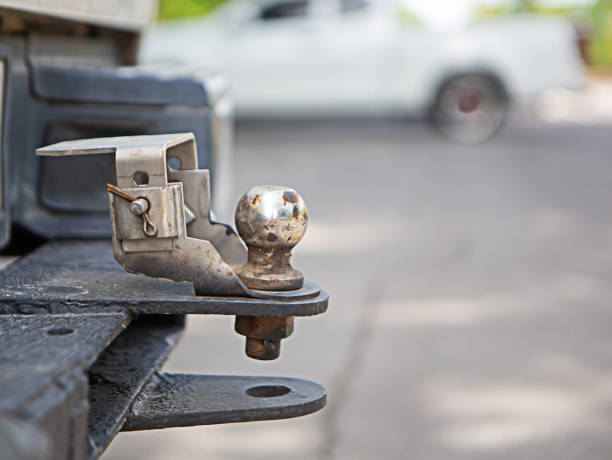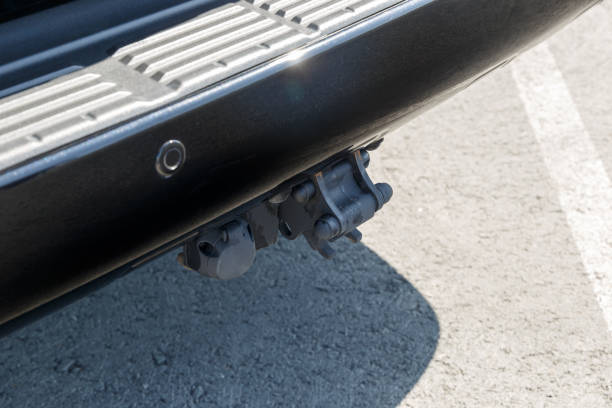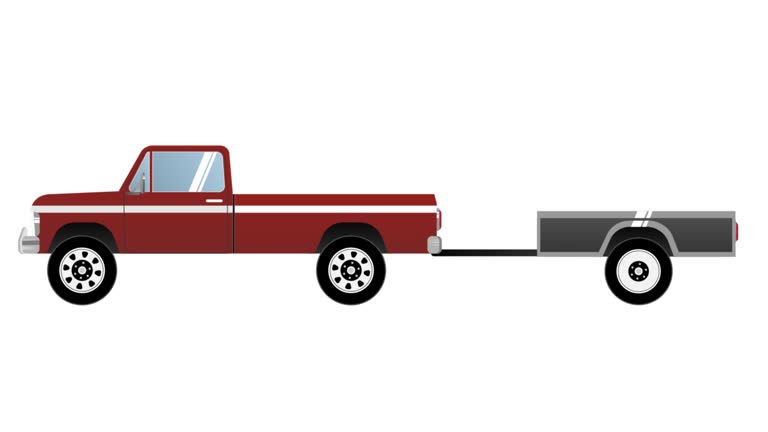Truck Bed vs Bumper Hitch Towing: Which Method is Right for Your Hauling Needs?
Truck Bed vs Bumper Hitch Towing
When truck owners strategize on the different options available, towing is one of the most crucial decisions that truck owners must make. Both solutions have their own benefits and potential restraints, and the correct choice will considerably affect the safety, stability, and efficiency of transport. Whether you are towing a travel trailer, carrying building supplies, or hauling heavy equipment, being well versed on the pluses and minuses of Truck Bed vs Bumper Hitch Towing can save you hours, dollars, and tantrums. This guide takes apart the core distinctions, real-life usage, professional viewpoint, and so on, so you can arrive at an appropriate decision to buy what suits your hauling needs.
Read the fundamentals of Truck Bed vs Bumper Hitch Towing.
To begin with, it would prove helpful in defining the meaning of the following words. A towing bed is usually a fifth-wheel or gooseneck hitch installed into the bed of a pickup truck. They are common in RV enthusiasts and horse trailers as well as in most of the transported goods because they will retain a better weight distribution and also offer enhanced driving abilities to move with a greater capacity weight. On the other hand, it can be bumper hitch towing (receiver hitch towing), where a towing hitch is fixed to the back bumper or below it. It is easier to do and, in general, less costly and appropriate on lighter loads, say small utility trailers, boats, or bikes. Truck Bed vs Bumper Hitch Towing boils down to capacity, control, and the type of thing that is being towed.

Variance of the weight distribution and carrying capacity
Load is one of the critical variables in the Truck Bed vs Bumper Hitch Towing debate. Truck bed towing, particularly through gooseneck or some fifth-wheel hitch connections, has significantly greater towing capacity, averaging between 15,000 and 30,000 pounds (depending on the vehicle and hitch type). This is achievable since the hitch itself is mounted over the rear axle, which gives the truck an improved chance of counterbalancing the weight. Conversely, a bumper towing hitch usually puts out at 10000 pounds (including a weight distribution hitch), and the vehicles enumerated are much lower. Towing in truck beds is not just useful but obligatory to the drivers who must transport an increased weight regularly.
Maneuverability and Driving Experience
Driving experience is one more variable in the balance of all these. Hitches that are attached to the bed of the truck have an improved maneuverability range, especially backing up and making turns. It is more agile and easy to control as a result of the center of gravity being closer to the center of gravity of the truck. Bumper hitches, in turn, move the towing point farther to the back, permitting more trailer wagging and limiting a turn-on-a-dime possibility. The drivers said that the trucks are more stable and predictable when towing the rear on the highway or on a rough surface.
Installation and setup Ease
In regard to installation design, the bumper hitches are more convenient to install and easier to use for casual or occasional towing. They do not tend to require numerous tools and may be installed without expert aid. This augments the bumper hitch towing advantage to weekend warriors and do-it-yourselfers. Truck bed towing, on the other hand, needs to be connected to rails or brackets within the truck bed, making it a generally cutting-intensive installation procedure. Even though such installation offers a more professional quality of connection, it is more labor-intensive and time-consuming (and requires an occasional trip to a professional installer). Then, in the Truck Bed vs Bumper Hitch Towing factor, factor in how much you tow and whether you are up to a longer-term, larger-capacity option.
Benchmark Prices and Longevity
The other place where Truck Bed vs Bumper Hitch Towing choices vary is the cost. Receiver hitches have the advantages of being more economical in initial costs and less labor-intensive to install. A decent bumper hitch might cost anywhere between 150 and 400, and a decent gooseneck or 5th wheel hitch assembly between 500 and well over 1.5k, excluding installation expenses. However, in the case when the large trailers are to be towed permanently, then the long-term value of truck bed towing might surpass the short-term value that is purchase cost. It reduces the wear and tear of the vehicles, improves fuel economy due to the balanced placement of the loads, and reduces the probabilities of the trailer sway that might lead to accidents.
Safety and Legal Elements
Looking at the two, Truck Bed vs Bumper Hitch Towing what is safest is what is most important. Truck bed systems are designed to be more stable because they distribute weight equally. This is safer towing, particularly at the higher velocities or in poor weather. States and provinces also usually have a regulation regarding trailer size and its weight relative to the type of hitch it is pulled by. An adverse combination of hitch and overload can result in a fine, the non-paid insurance indemnity, or worse. Just make sure you are not over your limit and legal when you tow by becoming aware of towing regulations where you live and then lining your rig accordingly.
Depending on what to pick, use Cases of Real World.
Some practical situations in which Truck Bed vs Bumper Hitch Towing is a critical decision we must now consider. A truck bed tow can be the most reasonable thing to do when it comes to transporting heavy equipment as a contractor or as a horse owner whose horse needs a multi-animal trailer. Safe and whooshing transportation can be provided by your strengthened control and possibility. On the other hand, perhaps you tow a little travel trailer every six months, or you need a weekend toy like bikes or an ATV; well, a simple bumper hitch will do, and it is a whole lot more practical. The suitability of the kind of hitch you are employing and the pattern in which you utilize it ought to be comparable as well to ensure guide safety that is also effective.
Maintenance and Durability Factors
Another aspect of consideration in the decision is durability and maintenance. Industrial-grade steel Truck bed hitches Truck bed hitches of this type can be made of industrial-grade steel that will last long. They are very sturdy and can withstand large braking, acceleration, or turning. Bumper attachments are strong by themselves but are more prone to wear by being used when overloaded or in bad condition. Both systems will need regular checkups to examine the work (to search for rust, cracks, and bends), but, in general, no matter how strong the quality of the truck bed is, the truck bed systems should rarely be maintained because the truck bed is strong and in the in-bed installation, so it will not be subjected to road debris or salt, which generally drive routine maintenance.
The Position of the Truck Type and Structure of the Truck
The vehicle you drive will also affect the choice of whether to use or not use Truck Bed vs Bumper Hitch Towing. On the same note, not every vehicle is created to tow under high-capacity bumpers unless it is upgraded with upgraded suspension or brake controllers. It is limiting to the owner’s manual of your truck and towing specifications before deciding to buy either system. Always consider making decisions based on what your car can do and not what you believe it can do.
Factors of Environment and Fuel
The lot effect cannot be avoided by fuel, and all you can do is either reduce its impact or increase it through the process you use. More properly balanced, thus typically allowing easier aerodynamics and favorable vehicle fuel economy during highway travel at regular travel speeds, are truck bed towing systems. Bumper hitch vehicle towing that has too many poorly axled hitches will translate to reduced mileage, and it can increase dragging. Towing on truck beds may be a small but significant long-term advantage to me in the kind of fuel efficiency and environmental impact.\

In Conclusion: The Right Choice for Your Towing Needs
Finally, the argument here is not an argument concerning which is more appropriate everywhere, but one that will serve your needs. Occasional or frequent towing is outperformed by truck bed towing in terms of capacity, stability, and cost of long-term value. This one is flocked to by the professionals or serious adventurers. Meanwhile, bumper hitch towing is very low-priced, convenient, and applicable to light-dollar assignments.
FAQs
Is motor towing safer as compared to bumper towing?
Heavy loads are generally safer to tow on truck bed-towing due to its better weight distribution and a slight reduction in sway, especially when going to higher speeds or driving in bad weather.
How difficult is it to do both bumper hitch and truck bed towing?
Converting introduces the necessity to get a fifth-wheel or gooseneck hitch inserted into your car bed, and this is a more complex process and one where you potentially need to use the services of a professional but is achievable on the right vehicle and with the relevant equipment.

0 Comment